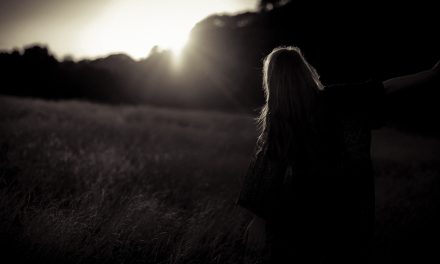GREEN IS MY FAVOURITE COLOUR
★ ★ ★ ★
By Romina Pastorelli
My first home, when we moved from the North of England to the North of Italy, had a big field where I used to spend all my time regardless of the season. I remember having my first flashes of self-awareness standing in what, to me, was a vast meadow, but in truth was just a wide field. The open space, the sounds and smells challenged my senses and made me see myself as a living creature, still not quite human, but somewhere between my pet cat and my more evolved (only older, really) siblings. We had a massive rosemary bush with wild strawberries growing underneath it, which we used to pick and eat right there. A solitary plum tree, which grew plums the size of oranges, provided the only shade in the garden. When hauled inside by my mother at sunset we smelled of fresh air, rosemary, grass, rosemary, nettles, and of course, rosemary.
With the ever-changing circumstances of my family, we moved around the Padan plain, ever in pursuit of a corner of England—a reminder of the playground near my grandmother’s house or the Lake District. We were always lucky enough to find a place with a garden and a sprawl of nature around us—a far cry from the English countryside, but still…
In one particular housing estate, as well as a large communal garden, we enjoyed fields, crops and the woods. They belonged to the military but were ours to use. I always felt grateful towards the generous army for that. It was probably forbidden and extremely dangerous, but we didn’t think much about the rules and restrictions or the hazards. But somehow we made it to adulthood.
The woods were a special and mysterious place, where we lived a parallel fantasy life. My older brothers and I used to go, or should I say, they went and I tagged along as the unwanted younger sister, down the slanting dirt road. Once in the woods there would be dozens of children of all ages and sizes with customised bikes, BMXs, scramblers, makeshift two-wheeled means of transport, and never the users’ right size. When it snowed those vehicles were replaced by bob-sleighs, wooden sleds and even skis! We lit fires, built sheds, fell into the creek, and arrived home sometimes drenched in water, and always in sweat, our clothes covered with green grass and mud stains, our arms and legs full of cuts and bruises after climbing trees or hiding in the shrubbery full of nettles and other wild prickly plants.
The smells were strong and changed according to the season. In autumn there would be whiffs of smoke from the fires of the local farmers burning dead leaves. In winter it would be the omnipresent frosty, foggy scent.
As I grew older the urge to be in a more civilised area grew, until I finally moved after university to Turin, known across the country as the industrial city par excellence, with all its small factories linked to the bigger omnipresent Fiat car factory. Truth be told, by the time I moved there, Turin had already started its conversion into a city of culture and was undergoing a massive revamp in preparation as host of the Winter Olympics.
And now, here in the heart of a city where I have discovered myself to be a true urban woman, I find nature still seducing me with its colours and smells. In the summer the lime tree-lined roads flanking the rivers and boulevard fill the air with the powerful scent of their blossom. Especially at night, its unmistakable smell assails me when I open the door to my flat. Sometimes when riding my bike that melancholic smell stirs wild memories and almost Proustian moments as it reconnects me to the night bike rides my mother and I would embark on in the summer when I was small.
I surprise myself by choosing my children’s school based on how many trees I find in the school courtyards, and pick the ones located in the greenest areas.
I go looking for the countryside within the city. I attract it even. Only a few days ago I almost felt like Calvino’s Marcovaldo (who was stupefied when he found that mushrooms had sprouted in a flowerbed in the city pavement) upon finding that a bright pink petunia had blossomed at the foot of the parking meter near the school where I teach. My children always see me as wearing green—‘It’s your favourite colour mummy!’
Green is my favourite colour, yet I would never move back to the countryside.
I ask myself, how can you possibly beat the practicality of living in the city? Especially where I live, in San Salvario, the bowels of Torino. Everything is at a walkable distance, or a ten-minute car ride away. There are numerous shops, supermarkets, eateries for all tastes, upmarket restaurants, cheap kebab kiosks, drug-dealing, people playing in the street, you have it all.
I would miss the quintessence of humanity that I find in the city, no more ploughing through the multitudes of hipsters, pushers, straight, gay, different ethnicities and Piedmontese natives. There’s noise, shouting, raging, crying, singing in all languages. How could I ever adjust again to the silence, the calm, the endless days and the narrow-mindedness of the orderly people living in the province’s small villages? Yes, the children would benefit from the fresh air and space, they would be happy little animals, but then I would be a slave to the car and having to drive for hours in the traffic to get to the nearest city. And what is worse is that I would be a visitor, a guest in my own city. The thought of that is impossible! And then when I have finished all these arguments, which arise especially on the days when the sun is shining and guilt towards my city-bound children surfaces, the simple and inescapable truth appears—that my wrestling with Nature is pointless. Because before too long a corner of England within Italy will call again to that animal child within me, and I will lose myself in its overwhelming beauty.

Romina Pastorelli is a writer, English teacher, translator and mother of two. Between her jobs and looking after her children, she squeezes in some yoga and is finishing her first novel. She lives in Turin, Italy.



























